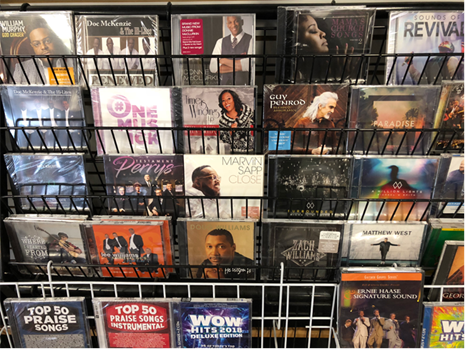This is the fifth in a series of essays about The State of Christian Music —what’s happening, how things are going, and what we can do about it.
I want to address an important but faulty assumption at the heart of what it means to be a Christian who makes music.
The assumption is this: That Christian music is a real thing.
Try defining the term.
Is Christian music “music that glorifies God”? If so, how do you know which music glorifies God and which music doesn’t? Does each listener decide for themselves? Does your pastor decide? Should we set up an altar like Elijah and ask God to signal whichever piece of music is most godly by consuming it with fire (1 Kings 18:20-40)?
Is Christian music “safe for the whole family”? What about when an artist wants to make music drawn from difficult biblical texts, such as those that address war, slavery, or genocide? Are there parts of the Bible that should be off limits for a Christian musician?
Is Christian music whatever is appropriate to be sung or played in church? What about the rest of the week? Is God only glorified on Sunday mornings in a church building? What about congregations that meet in public spaces like schools, movie theaters, or libraries?
Or is Christian music simply “music created or performed by someone who is a Christian”? Even that definition can be problematic. Who gets to decide who is Christian? If a person of faith writes a song that we think of as Christian and then later disavows their faith, is that song still a Christian song?
I think most people define Christian music the same way that United States Supreme Court Justice Potter Stewart described obscenity in the case of Jacobellis v. Ohio. “I shall not today attempt further to define the kinds of material I understand to be embraced within that shorthand description,” said Justice Potter.
“But I know it when I see it.”

The purpose behind the term
Attempts to define Christian music are essentially pointless because they assume the term is rooted in some theological, ministerial, or ecumenical basis. It’s not. It’s a genre term, and like all genre terms, it exists primarily to promote the music for commercial purposes.
Christians make music in all varieties of styles, of course—country, rap, and R&B. Doo-wop and barbershop quartets. Southern gospel, heavy metal, disco, reggaeton, soca, calypso, acid jazz, dubstep, UK grime, trance, house, Europop, screamo-punk, and trap gospel. When you say “Christian music,” you are basically saying the song, artist, or album is intended FOR Christian people.
In the 1990s, people purchased their music on cassette tapes or compact discs. If you grew up in the evangelical subculture like I did, you probably bought a lot of your music at a Christian bookstore. During that time, music was a huge revenue driver for retail chains like Lifeway and Christian Supply. To aid consumers in their music selection process, they used to create charts that compared the artists on Christian record labels to their more famous secular counterparts.
“If you like New Kids on the Block,” the chart would promise, “then you’ll love DC Talk!”
“If you like Boyz II Men, you’ll love Take 6 and Men of Standard!”
“If you like The Spice Girls, you’ll love Zoegirl!”
“If you like Santana, you’ll love Salvador!”
If those charts were around today, they might read, “If you like Eminem, you’ll love NF!”
Whether or not they say it that explicitly, this is the promise inherent in the term “Christian music”: whatever kind of music you like, there’s a “Christian” version of it that’s just as good, if not better.
But that promise was only partially true.
Noun Versus Adjective
What can we learn from the exercise of trying to define “Christian music”? The word Christian makes an excellent noun, but a terrible adjective. Only people—human beings with immortal souls, made in the image of God— can be Christians. A song cannot be Christian any more than a hamburger, a fuel injection carburetor, or an insurance policy can.
The reason we don’t talk about Christian hamburgers is that we understand our life in Christ is a vibrant relationship with the living God. We get that a person’s skill in making a carburetor is distinct from their character. After all, one can be a terrible person and still make a great hamburger. On the flip side, you can also be a virtuous person and make a terrible carburetor.
But when we talk about “Christian music,” all that seems to go out the door. We make all these assumptions about what motivated a specific performance, who is the intended audience of a specific piece, or the intended meaning of the lyrics. And then we judge other forms of music by how well they line up with our assumptions about what it means to be a Christian.
The existence of so many different expressions of our Christian faith—a wide range of church traditions and denominations—can be a testament to the diversity of theological expressions and understandings. But we don’t usually take this variety into account when we describe music as Christian. Instead, our own cultural, geographical, and socioeconomic biases determine whatever we mean by “Christian” every time we use it as an adjective rather than a noun.

Then Versus Now
To be fair, some of these assumptions happen for good reasons. For example, many parents need help finding music that is both age- and content-appropriate for their children. That’s one reason Christian bookstores (or “bookstores marketed to Christians”!) were so attractive in a previous generation. You could trust that any CD on sale there would be free from potentially objectionable content your kids might see if they turned on MTV or VH1.
But when it comes to what we usually think of as Christian music today, such gatekeepers no longer really exist. There’s no such thing as Christian YouTube or Christian Instagram. In 2025, if a Christian wants to make music and draw listeners to it, they use the same streaming apps as everyone else.
And music marketing has become so thoroughly conflated with social media that the biggest stars are now the ones with the biggest online platforms. Megachurches burnish their brands by using original music as a key component of their social media strategy. If I watch a YouTube video by Hillsong Young & Free or Elevation Rhythm, YouTube serves up what’s next based on its algorithm, not on whether it’s made by or for Christians. So on a practical basis, there’s no difference between music that is marketed as Christian and music that isn’t.
Even if we factor in songs designed to be sung in worship services, many of them are created to have as wide an appeal as possible. They may address God in the second person (by saying “You” instead of “God” or “Jesus”), and they may have encouraging, upbeat vibes. From the perspective of the music industry, this is intentional. Engagement metrics like streams, views, clicks, and sales are theologically agnostic. Spotify doesn’t care why you listen as long as you keep listening.
That’s why singing competition shows like The Voice or American Idol continue to court viewers by showcasing musicians who are known to be people of Christian faith. Producers and executives understand that many of today’s stars got their start singing in church, and they want to nurture their connection to the churchgoing segment of their audience so they can discover another generation of stars to platform and monetize. But industry executives probably don’t know the difference between an authentic worship song and one that isn’t, in part because that’s an artificially created distinction with boundaries that are porous at best. Yes, there’s a difference between someone who exhibits Christian behavior and character, and someone who doesn’t. But at the end of the day, songs are just songs. And often the spiritual value or meaning in a song is in the eye of the beholder.

Conduct Your Own Taste Tests
If you’re of a certain age, you might remember TV commercials for coffee or soft drink brands where members of the general public would taste two drinks without any branding and try to guess which was which. Allow me to conduct a quick version of that taste test gimmick. One of the following sets of lyrics is from a song by a popular Grammy-winning artist and television personality. The other is from a song by a popular megachurch worship ministry. Some would call one of them sacred, the other secular. Let’s see if you can tell which is which.
Song A: “Oh, my Father, worship, return to that place, it’s only you that makes me all I am.”
Song B: “Yeah, it’s a party…don’t delay there is no hold up…come on and dance, it’s a new day.”
Which one is the Christian song by worship leaders, and which one is the secular tune by the TV personality?
The first set of lyrics is taken from “Worship,” by Jon Batiste, the Grammy-winning jazz musician and pop singer who was the bandleader on CBS’s The Late Show with Stephen Colbert for several years. (Like his former boss, Batiste is known for being outspoken about his Christian faith.) The second set is from “AQUI ESTOY,” the hip-hop/R&B Spanglish banger from Elevation Rhythm, cowritten and performed by Brittany and Nate Diaz, which was written for Elevation Church’s annual youth conference. Both tunes blend elements of faith and devotion with elements of celebration and spectacle. I think of them both as Christian music, and they’re both huge favorites of mine.
And that leads to my final point.
In Matthew 15:11, Jesus tells the assembled crowd that it’s not ultimately what goes into a person’s mouth that defiles them, but what comes out of it. He was being asked why his disciples were breaking the traditions of the elders. In 21st-century North America, many of us have grown comfortable with a traditional understanding of Christian music. Perhaps we have become complacent in our discernment, assuming that anything that comes from an approved Christian source is good or edifying.
This ambiguity about which songs are Christian is ultimately a good thing. Because it forces us to do our own taste tests. We read the Word of God and discern how we understand doctrines and biblical interpretations about which Christian musicians are likely to communicate. We cannot rely on music labels or bookstores to do our thinking for us. And we certainly can’t rely on the algorithms. We have to do that work for ourselves and in community.
So as we seek to fulfill Jesus’s mandate to go and make disciples, we must go deeper than a surface level understanding of discipleship, especially as it relates to music. We need to find music that helps promote a communal ethic of spirituality consistent with the life of Jesus. Whatever helps cultivate the fruit of the Spirit in us is worth listening to—because what we take in eventually shapes what comes out of our mouths.
At the end of the day, it matters less what we say we are than how we demonstrate it. So let’s worry less about the labels and more about whether or not our music helps us live like Jesus lived.
It’s about whether our lives carry the aroma of Christ. That’s what’s real.














